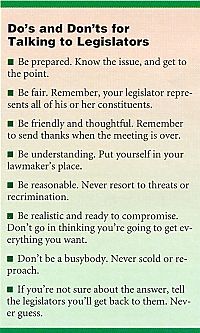How Physicians Can Effect Changes in Health Care Policy
WASHINGTON-Eric S. Berger, vice president of planning and public policy, US Oncology, Inc., Houston, has a word of advice for cancer care providers seeking to influence legislators: “Speak from the heart.”
WASHINGTONEric S. Berger, vice president of planning and public policy, US Oncology, Inc., Houston, has a word of advice for cancer care providers seeking to influence legislators: Speak from the heart.
The best way to communicate with lawmakers and their staff is to make a connection with them. Therefore, he said, sometimes the most effective way to get a point across about cancer needs is to make it possible for them to hear from patients, their families, and their providers the people most directly affected by the issue being addressed.
Convey to them that the issue has a face, he said at the Association of Community Cancer Centers annual meeting.
Use personal experience, said Betsy D. Mitchell, a governmental consultant with the ACCC in Springfield, Illinois, who joined Mr. Berger on a panel about how to navigate the halls of policy-making. The session was organized, she said, because, increasingly, health care policy rather than medical evidence is influ-encing care. Thus, providers are being urged to participate more in the policy-making process.
Ms. Mitchell, whose experience focuses on state-level activity, had a number of suggestions for the audience. Finding who knows who was at the top. Sometimes physicians live next to lawmakers, she said. Sometimes they live with their lawmaker! It may be their spouse!
Knowing the issue was also prominent on the list, but coupled with that was being able to talk about it, a point also emphasized by Mr. Berger, who was formerly health counsel on the House Commerce Committee. After you get past the niceties, Mr. Berger said, the congressmanwho has a very limited amount of timewill turn to you and say, So, what are you here for today? Suddenly, the room gets very silent.
People in this situation will often turn to their lobbyist, but congressmen meeting with constituents dont want to hear from professional lobbyiststhey meet with them day in and day out, Ms. Mitchell said. They want to hear from you, she emphasized.
She also suggested that when writing to a congressperson, keep what you know to one page.
In addition to knowing the issues at hand, it is also important to educate yourself about the legislative process, she said. Timing is very important, she added.
Constituents with no experience in lobbying can still function as effectively as lobbyists, she said, since lobbying means attempting to influence someone elses actions or opinions. Good lobbying, she said, is being able to make your point of

view interesting and relevant. Her advice for lobbyists:
Never lie or mislead. Although you want your legislators to remember you, you want it to be for the right reason. If you lie, theyll definitely remember you, she said.
Look for friends in unusual places. Never cut anyone off from contact, she said. Also, dont waste time and attention on your opponents. Shore up your support instead, she said.
Never forget to give thanks and give credit to others.
When youre crossed politically, dont get mad, get even. Remember, Ms. Mitchell said, the power at the ballot box is yours.
Ms. Mitchell also suggested that busy state-level legislative staff will sometimes try to avoid tackling an issue by saying, I understand theyre working on this on the federal level.
Dont let that stop you, she urged. Say, We need it in this state, too.